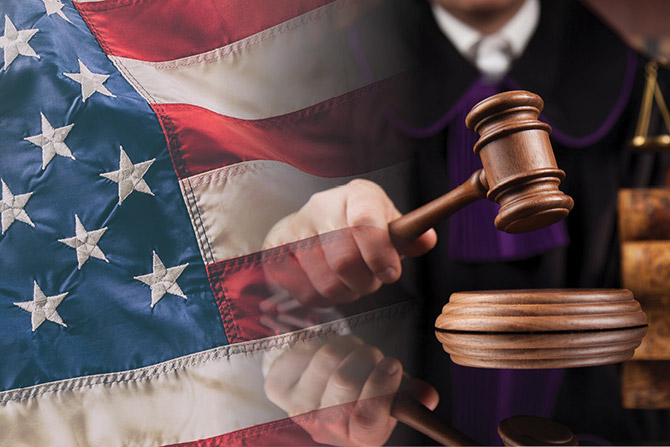There is a broad sense right now that, no matter what side of the political spectrum one falls on, the government isn’t remotely responsive to the desires of the American populace in any way.
In any society, there are certain myths that are regularly enforced and impressed upon the public, both in order to maintain institutional legitimacy and to quell a restless public. America is no different as we have a litany of myths that most Americans don’t contemplate that often, but, when pressed, often fall back on the default option of, “That’s how it’s always been, so it must work fine.” One of the most enduring myths in America has been the wisdom, impartiality, eminence and sterling reputation of the Supreme Court.
However, in recent years, the Supreme Court has become a lightning rod for controversy, as it’s essentially become a haven of judicial supremacy and political activism from the bench. Any pretense of impartiality, eminent judicial wisdom and impenetrable institutional legitimacy is long gone, and all we’re left with is a completely unaccountable group of unelected officials with absolute power and total impunity. No matter what side of the political spectrum one falls on, most rational people can agree it’s wildly undemocratic to have completely unaccountable, unelected officials making massive, sweeping changes to our laws and system without any dissent, debate or even public discussion.
In early July, the Supreme Court wrapped up its term and left a group of historic rulings in its wake that could radically reshape the government. According to Georgetown Law Professor Cliff Sloan, who has argued several cases before the Supreme Court, these rulings are not to be taken lightly. “This is a court that is in a hurry to drastically reshape the law. It’s in a hurry to throw our precedents and upset settled law and make profound and fundamental changes in our law,” said Sloan. “In that sense, it’s one of the most extreme and radical Supreme Courts we’ve ever had. And this term really shows that.”
Perhaps the ruling that will affect the everyday lives of Americans the most is that in the case Loper Bright Enterprises v. Raimondo. The 6-3 ruling, overturning a 40-year-old precedent, limits the ability of federal agencies to regulate the environment and public health, among other issues. Federal agencies will face a multitude of challenges in court. “It affects the authority of the agencies that protect our water and air, our food safety, our nuclear safety, the economy-tremendously important government institutions. And the Supreme Court has just gutted the structure that we’ve been operating under for decades,” Sloan says. “It basically has shrunk the power of the government agencies and the experts, and it has dramatically increased the power of federal judges who have absolutely no expertise in these very important and complicated areas.”
George Washington University Law School Professor Paul Schiff Berman went even further than Sloan in his criticism of the Supreme Court, saying it is waging a sustained “assault on democracy” this term while expanding the court’s role as “the principal arbiter of American life.” “The court made it more difficult to protect voting rights of racial minorities, more difficult for administrative agencies to fulfill their congressionally mandated role and far more difficult for anyone to hold the president accountable — even if that president acts to overthrow democracy itself,” Berman said. “The result will be a continued disconnect between the court and the wishes of the American people, with grave consequences for the rule of law and the court itself.”
Perhaps the most high-profile ruling the Supreme Court issued was in Donald Trump v. United States, which weighed whether and to what extent a former president enjoys presidential immunity from criminal prosecution for conduct alleged to involve official acts during his tenure in office. The case related to presidential immunity as it relates to Trump’s role in the January 6, 2021, attack on the Capitol. The court ruled 6-3 that presidents are entitled to immunity from prosecution for official acts taken in connection with the exercise of their core constitutional responsibilities and a presumptive immunity with regard to other official acts. But they decided that presidents are not entitled to immunity for unofficial acts. The justices sent the case back to a lower court to decide which of Trump’s actions were official and which were unofficial. It is expected, based on the opinion of the majority written by Chief Justice John Roberts, that the lower court will take an extremely generous interpretation of “official Presidential acts.” Roberts and other justices are believers in the “unitary executive theory,” which grants the president extremely broad powers and very few checks on the president’s authority.
Justice Sonia Sotomayor, joined by Justice Elena Kagan and Justice Ketanji Brown Jackson in one of two dissenting opinions, wrote that the majority’s ruling, “makes a mockery of the principle, foundational to our Constitution and system of government, that no man is above the law. The president of the United States is the most powerful person in the country, and possibly the world. When he uses his official powers in any way, under the majority’s reasoning, he will now be insulated from criminal prosecution. Orders the Navy’s Seal Team 6 to assassinate a political rival? Immune. Organizes a military coup to hold onto power? Immune. Takes a bribe in exchange for a pardon? Immune. Immune, immune, immune.” The ruling is shockingly undemocratic, but it’s what the American public has come to expect from this Supreme Court. These are unelected officials completely reshaping our government, piling one wildly authoritarian and undemocratic ruling on top of another.
In a third ruling recently issued by the Supreme Court, it essentially legalized bribery. In the case Snyder v. United States, the court ruled 6-3 that “gratuities,” i.e. post-facto gifts and payments, are not technically bribes, and is, therefore, not illegal. The majority’s interpretation held that bribes are only issued before the desired official act, and their meaning is therefore more explicit. The majority deemed that the concept of gratuities, often expressed in gifts and payments of great value, is issued in a more nebulous grey area, and, therefore, not illegal. The case concerns James Snyder, who, in 2013, was serving as the mayor of the town of Portage, Indiana. In late 2013, the city of Portage awarded a contract to trucking company Great Lakes Peterbilt and bought five tow trucks from them. A few weeks later, Snyder asked for and accepted a check for $13,000 from the company. Snyder was found guilty of corruption and sentenced to 21 months in federal prison.
Snyder argued that the kickback was not illegal because it came after he awarded a contract to the company that ultimately paid him off, not before. Ridiculously, the Supreme Court agreed with Snyder, classifying such payments as tokens of appreciation and claiming they are not illegal when they are not the product of an explicit agreement meant to influence official acts in exchange for money. The court has taken an absurdly narrow interpretation of corruption, one in which only explicit, openly stated deals count as “corruption,” and all other forms of influence-peddling are something far more above board. In the majority opinion, Justice Brett Kavanaugh writes that in order to be an illegal bribe, a gift or payment must be accompanied by a “corrupt state of mind” on behalf of the official or benefactor. Obviously, it is practically impossible to prove a “corrupt state of mind,” so the majority ruling gives corruption an absurdly wide berth. As Justice Ketanji Brown Jackson wrote in her dissent, “The bribery versus gratuity distinction allows officials to accept rewards for official acts in ways that are functionally indistinguishable from taking a bribe.”
The mythology around the Supreme Court has been shattered, and a majority of Americans understand that it is a political entity, set on implementing a radical, unpopular political agenda through a series of unprecedented rulings. The justices aren’t all high-minded custodians of the law but highly influenced political actors in many cases. These unelected judges are issuing rulings that will further the disconnect between the desires of the American people and what comes out of Washington, D.C. There is a broad sense right now that, no matter what side of the political spectrum one falls on, the government isn’t remotely responsive to the desires of the American populace in any way. With these latest series of rulings, not all of which were discussed above, they have doubled down on the disconnect. They have decided that any semblance of democracy in America should be done away with. The Supreme Court’s recent actions should make Americans question how such an institution, subject to no accountability or even the slightest public input, has come to arguably become the most powerful governing entity in the country. Congress essentially doesn’t act anymore except in its own interests, handing an incredible amount of power to the courts. This should be alarming to any American who wants to hang on to any semblance of democracy.









